Leadership in Organizations: Styles, Theories, and Challenges
VerifiedAdded on 2023/03/17
|10
|2542
|46
Essay
AI Summary
This essay provides a comprehensive overview of leadership, examining various leadership styles, including autocratic, democratic, strategic, transformational, and team leadership. It delves into the historical evolution of these styles and their impact on organizational progress and performance. The essay also explores key leadership theories, such as contingency theory, situational theory, behavioral leadership theory, and trait theory, offering insights into their practical applications. Furthermore, it addresses the challenges that leaders face, such as maintaining humility, gaining confidence during setbacks, and implementing plans effectively. The conclusion emphasizes the importance of leadership in guiding organizations towards success, highlighting the need for leaders to develop better attitudes, strategies, and a deep understanding of leadership traits, techniques, and theories. This essay serves as a valuable resource for students studying leadership and management, offering a detailed analysis of the core concepts and challenges within the field.
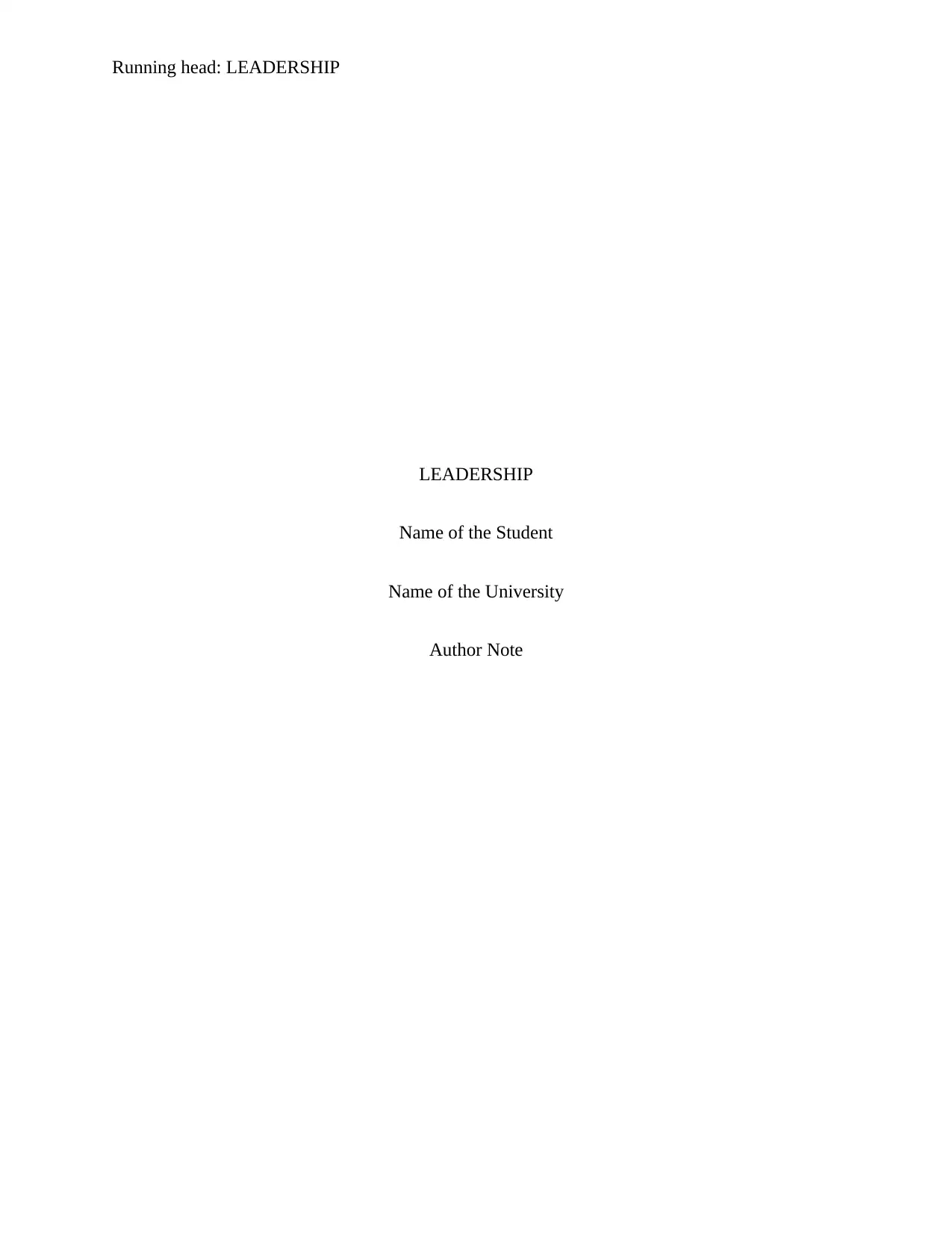
Running head: LEADERSHIP
LEADERSHIP
Name of the Student
Name of the University
Author Note
LEADERSHIP
Name of the Student
Name of the University
Author Note
Paraphrase This Document
Need a fresh take? Get an instant paraphrase of this document with our AI Paraphraser
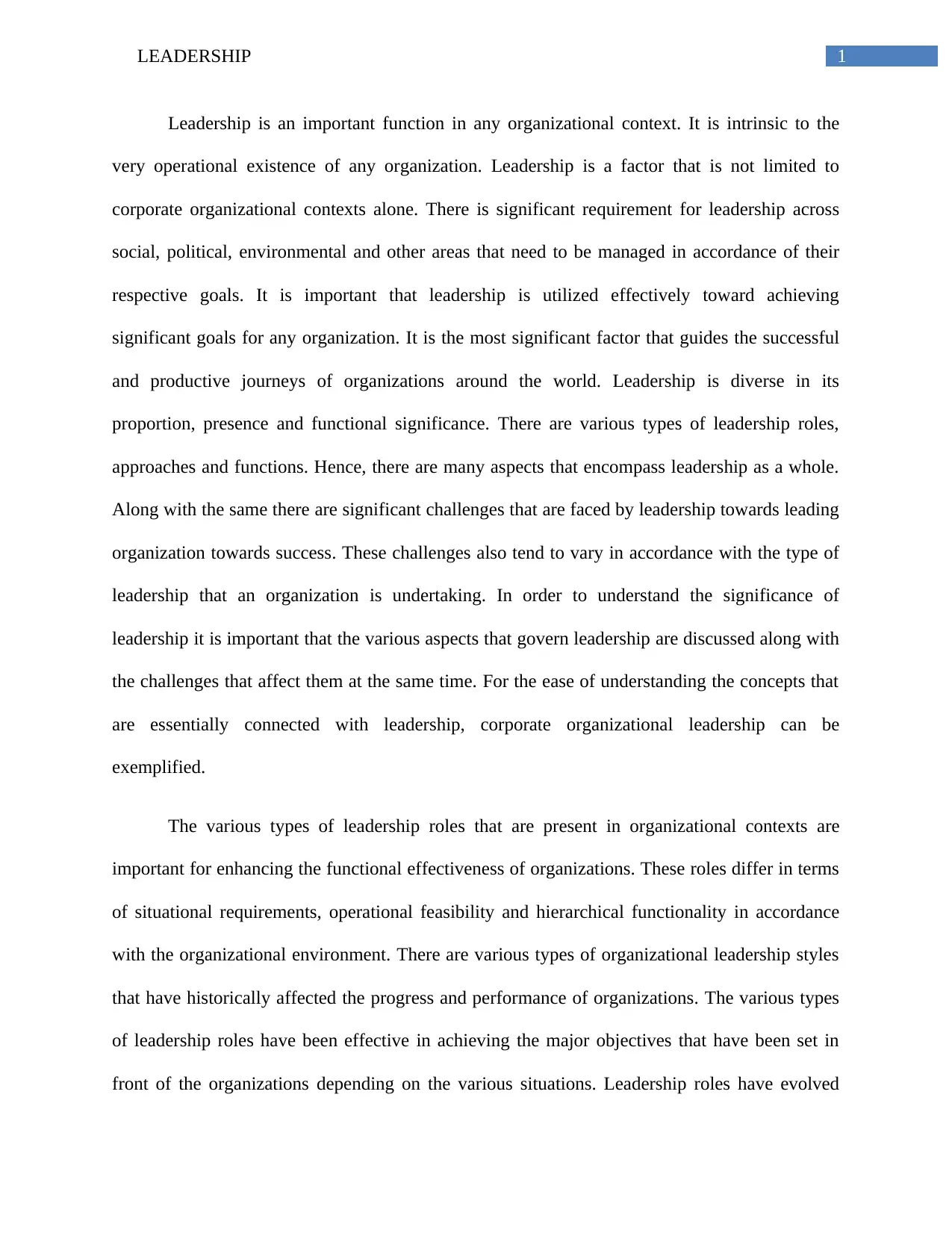
1LEADERSHIP
Leadership is an important function in any organizational context. It is intrinsic to the
very operational existence of any organization. Leadership is a factor that is not limited to
corporate organizational contexts alone. There is significant requirement for leadership across
social, political, environmental and other areas that need to be managed in accordance of their
respective goals. It is important that leadership is utilized effectively toward achieving
significant goals for any organization. It is the most significant factor that guides the successful
and productive journeys of organizations around the world. Leadership is diverse in its
proportion, presence and functional significance. There are various types of leadership roles,
approaches and functions. Hence, there are many aspects that encompass leadership as a whole.
Along with the same there are significant challenges that are faced by leadership towards leading
organization towards success. These challenges also tend to vary in accordance with the type of
leadership that an organization is undertaking. In order to understand the significance of
leadership it is important that the various aspects that govern leadership are discussed along with
the challenges that affect them at the same time. For the ease of understanding the concepts that
are essentially connected with leadership, corporate organizational leadership can be
exemplified.
The various types of leadership roles that are present in organizational contexts are
important for enhancing the functional effectiveness of organizations. These roles differ in terms
of situational requirements, operational feasibility and hierarchical functionality in accordance
with the organizational environment. There are various types of organizational leadership styles
that have historically affected the progress and performance of organizations. The various types
of leadership roles have been effective in achieving the major objectives that have been set in
front of the organizations depending on the various situations. Leadership roles have evolved
Leadership is an important function in any organizational context. It is intrinsic to the
very operational existence of any organization. Leadership is a factor that is not limited to
corporate organizational contexts alone. There is significant requirement for leadership across
social, political, environmental and other areas that need to be managed in accordance of their
respective goals. It is important that leadership is utilized effectively toward achieving
significant goals for any organization. It is the most significant factor that guides the successful
and productive journeys of organizations around the world. Leadership is diverse in its
proportion, presence and functional significance. There are various types of leadership roles,
approaches and functions. Hence, there are many aspects that encompass leadership as a whole.
Along with the same there are significant challenges that are faced by leadership towards leading
organization towards success. These challenges also tend to vary in accordance with the type of
leadership that an organization is undertaking. In order to understand the significance of
leadership it is important that the various aspects that govern leadership are discussed along with
the challenges that affect them at the same time. For the ease of understanding the concepts that
are essentially connected with leadership, corporate organizational leadership can be
exemplified.
The various types of leadership roles that are present in organizational contexts are
important for enhancing the functional effectiveness of organizations. These roles differ in terms
of situational requirements, operational feasibility and hierarchical functionality in accordance
with the organizational environment. There are various types of organizational leadership styles
that have historically affected the progress and performance of organizations. The various types
of leadership roles have been effective in achieving the major objectives that have been set in
front of the organizations depending on the various situations. Leadership roles have evolved
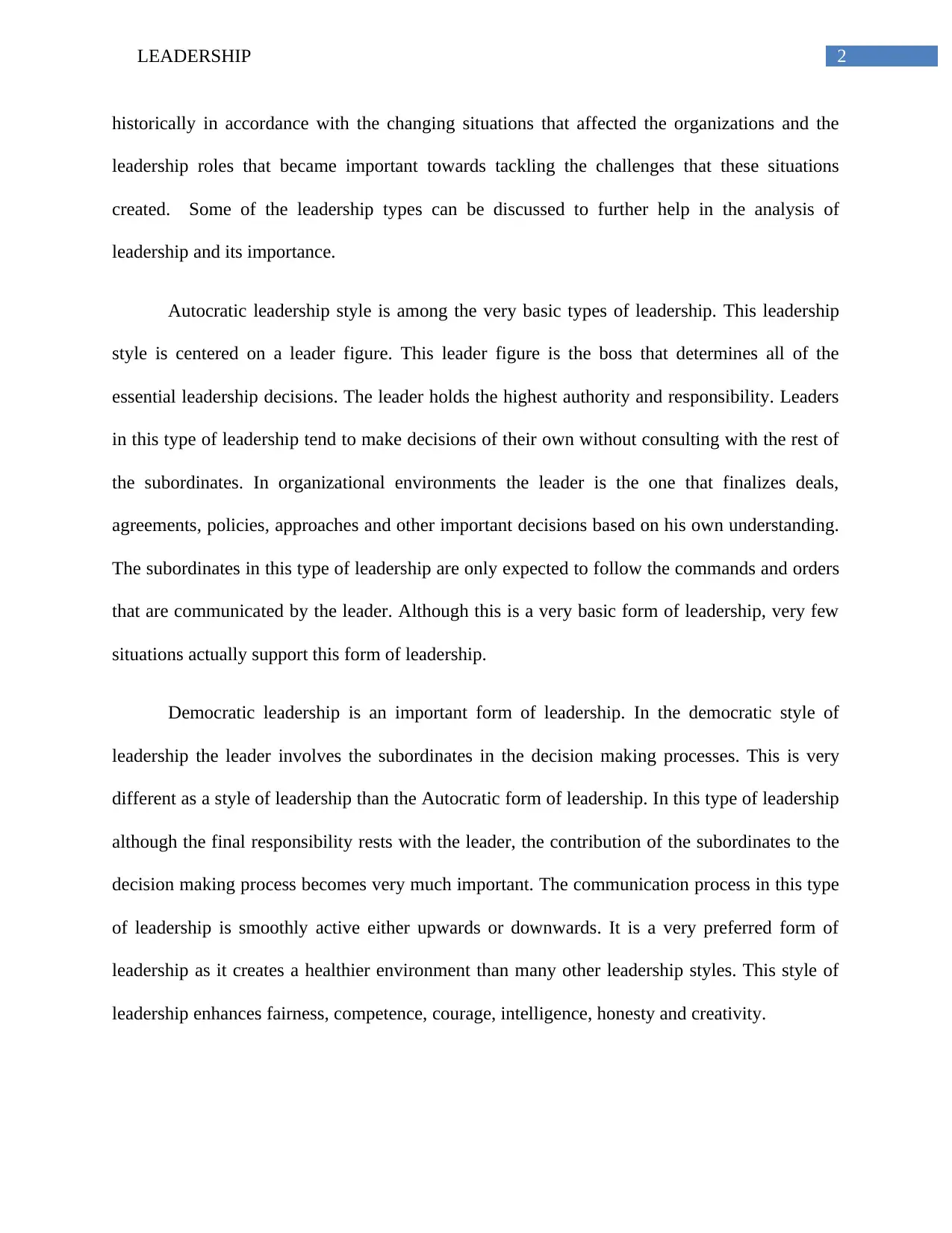
2LEADERSHIP
historically in accordance with the changing situations that affected the organizations and the
leadership roles that became important towards tackling the challenges that these situations
created. Some of the leadership types can be discussed to further help in the analysis of
leadership and its importance.
Autocratic leadership style is among the very basic types of leadership. This leadership
style is centered on a leader figure. This leader figure is the boss that determines all of the
essential leadership decisions. The leader holds the highest authority and responsibility. Leaders
in this type of leadership tend to make decisions of their own without consulting with the rest of
the subordinates. In organizational environments the leader is the one that finalizes deals,
agreements, policies, approaches and other important decisions based on his own understanding.
The subordinates in this type of leadership are only expected to follow the commands and orders
that are communicated by the leader. Although this is a very basic form of leadership, very few
situations actually support this form of leadership.
Democratic leadership is an important form of leadership. In the democratic style of
leadership the leader involves the subordinates in the decision making processes. This is very
different as a style of leadership than the Autocratic form of leadership. In this type of leadership
although the final responsibility rests with the leader, the contribution of the subordinates to the
decision making process becomes very much important. The communication process in this type
of leadership is smoothly active either upwards or downwards. It is a very preferred form of
leadership as it creates a healthier environment than many other leadership styles. This style of
leadership enhances fairness, competence, courage, intelligence, honesty and creativity.
historically in accordance with the changing situations that affected the organizations and the
leadership roles that became important towards tackling the challenges that these situations
created. Some of the leadership types can be discussed to further help in the analysis of
leadership and its importance.
Autocratic leadership style is among the very basic types of leadership. This leadership
style is centered on a leader figure. This leader figure is the boss that determines all of the
essential leadership decisions. The leader holds the highest authority and responsibility. Leaders
in this type of leadership tend to make decisions of their own without consulting with the rest of
the subordinates. In organizational environments the leader is the one that finalizes deals,
agreements, policies, approaches and other important decisions based on his own understanding.
The subordinates in this type of leadership are only expected to follow the commands and orders
that are communicated by the leader. Although this is a very basic form of leadership, very few
situations actually support this form of leadership.
Democratic leadership is an important form of leadership. In the democratic style of
leadership the leader involves the subordinates in the decision making processes. This is very
different as a style of leadership than the Autocratic form of leadership. In this type of leadership
although the final responsibility rests with the leader, the contribution of the subordinates to the
decision making process becomes very much important. The communication process in this type
of leadership is smoothly active either upwards or downwards. It is a very preferred form of
leadership as it creates a healthier environment than many other leadership styles. This style of
leadership enhances fairness, competence, courage, intelligence, honesty and creativity.
⊘ This is a preview!⊘
Do you want full access?
Subscribe today to unlock all pages.

Trusted by 1+ million students worldwide
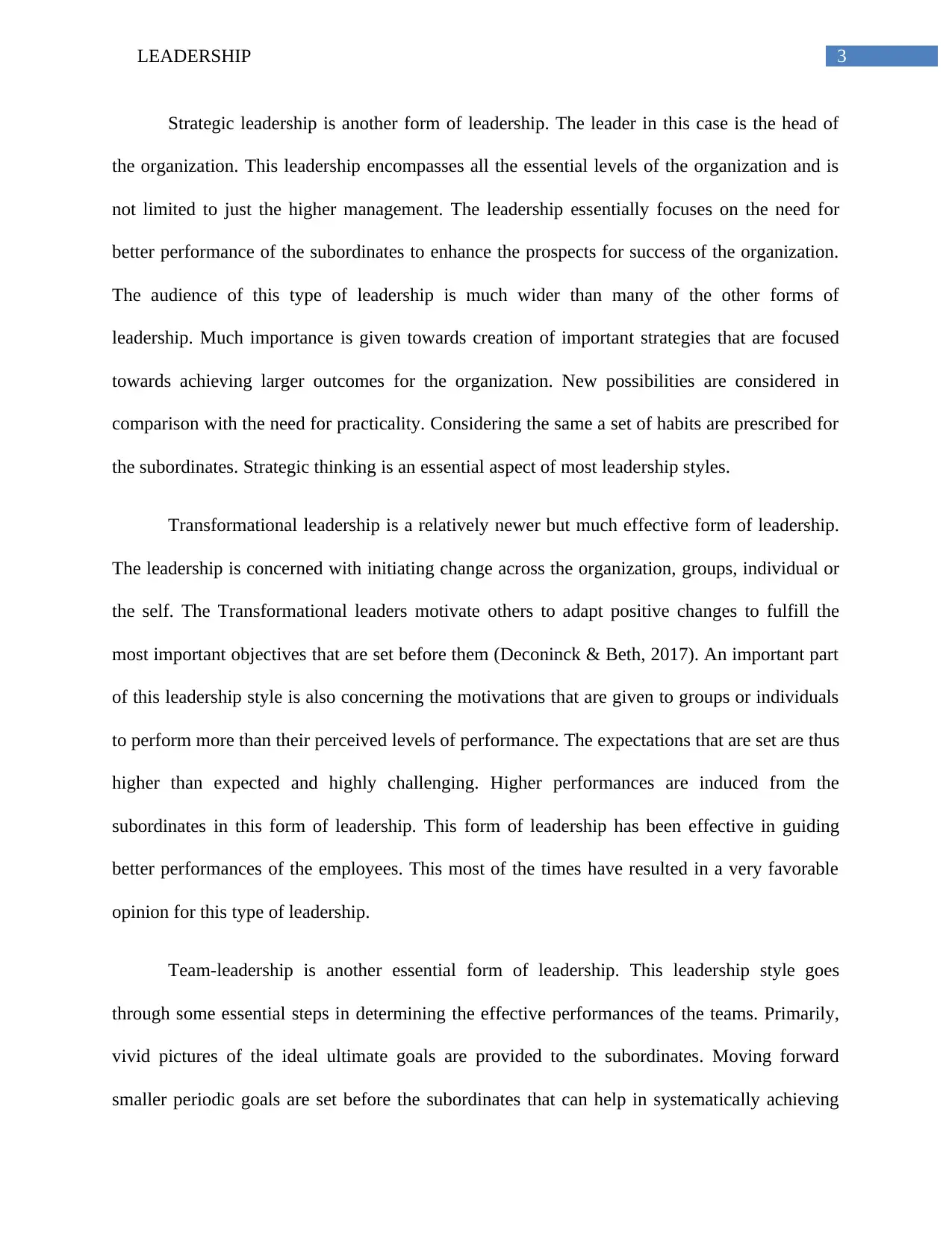
3LEADERSHIP
Strategic leadership is another form of leadership. The leader in this case is the head of
the organization. This leadership encompasses all the essential levels of the organization and is
not limited to just the higher management. The leadership essentially focuses on the need for
better performance of the subordinates to enhance the prospects for success of the organization.
The audience of this type of leadership is much wider than many of the other forms of
leadership. Much importance is given towards creation of important strategies that are focused
towards achieving larger outcomes for the organization. New possibilities are considered in
comparison with the need for practicality. Considering the same a set of habits are prescribed for
the subordinates. Strategic thinking is an essential aspect of most leadership styles.
Transformational leadership is a relatively newer but much effective form of leadership.
The leadership is concerned with initiating change across the organization, groups, individual or
the self. The Transformational leaders motivate others to adapt positive changes to fulfill the
most important objectives that are set before them (Deconinck & Beth, 2017). An important part
of this leadership style is also concerning the motivations that are given to groups or individuals
to perform more than their perceived levels of performance. The expectations that are set are thus
higher than expected and highly challenging. Higher performances are induced from the
subordinates in this form of leadership. This form of leadership has been effective in guiding
better performances of the employees. This most of the times have resulted in a very favorable
opinion for this type of leadership.
Team-leadership is another essential form of leadership. This leadership style goes
through some essential steps in determining the effective performances of the teams. Primarily,
vivid pictures of the ideal ultimate goals are provided to the subordinates. Moving forward
smaller periodic goals are set before the subordinates that can help in systematically achieving
Strategic leadership is another form of leadership. The leader in this case is the head of
the organization. This leadership encompasses all the essential levels of the organization and is
not limited to just the higher management. The leadership essentially focuses on the need for
better performance of the subordinates to enhance the prospects for success of the organization.
The audience of this type of leadership is much wider than many of the other forms of
leadership. Much importance is given towards creation of important strategies that are focused
towards achieving larger outcomes for the organization. New possibilities are considered in
comparison with the need for practicality. Considering the same a set of habits are prescribed for
the subordinates. Strategic thinking is an essential aspect of most leadership styles.
Transformational leadership is a relatively newer but much effective form of leadership.
The leadership is concerned with initiating change across the organization, groups, individual or
the self. The Transformational leaders motivate others to adapt positive changes to fulfill the
most important objectives that are set before them (Deconinck & Beth, 2017). An important part
of this leadership style is also concerning the motivations that are given to groups or individuals
to perform more than their perceived levels of performance. The expectations that are set are thus
higher than expected and highly challenging. Higher performances are induced from the
subordinates in this form of leadership. This form of leadership has been effective in guiding
better performances of the employees. This most of the times have resulted in a very favorable
opinion for this type of leadership.
Team-leadership is another essential form of leadership. This leadership style goes
through some essential steps in determining the effective performances of the teams. Primarily,
vivid pictures of the ideal ultimate goals are provided to the subordinates. Moving forward
smaller periodic goals are set before the subordinates that can help in systematically achieving
Paraphrase This Document
Need a fresh take? Get an instant paraphrase of this document with our AI Paraphraser
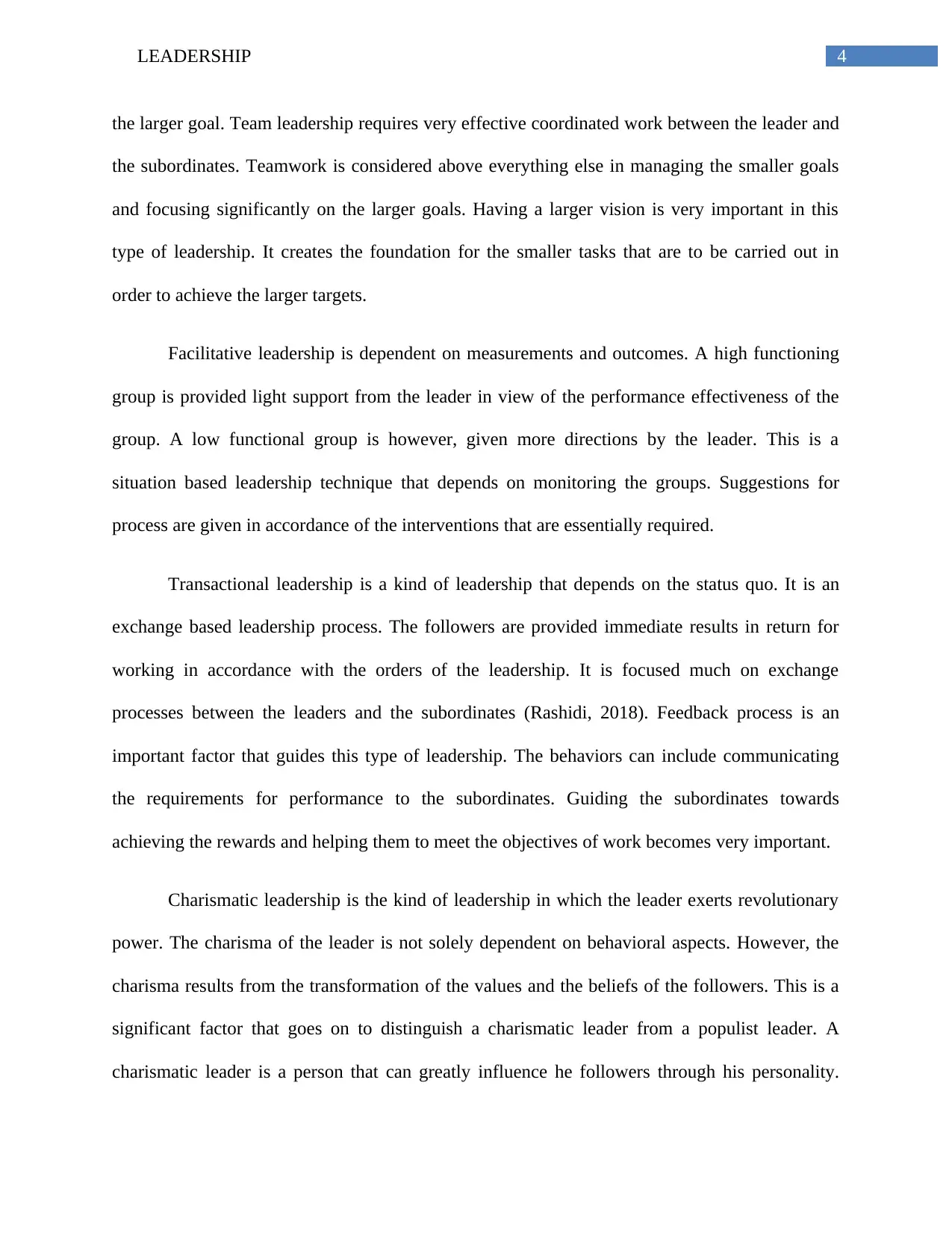
4LEADERSHIP
the larger goal. Team leadership requires very effective coordinated work between the leader and
the subordinates. Teamwork is considered above everything else in managing the smaller goals
and focusing significantly on the larger goals. Having a larger vision is very important in this
type of leadership. It creates the foundation for the smaller tasks that are to be carried out in
order to achieve the larger targets.
Facilitative leadership is dependent on measurements and outcomes. A high functioning
group is provided light support from the leader in view of the performance effectiveness of the
group. A low functional group is however, given more directions by the leader. This is a
situation based leadership technique that depends on monitoring the groups. Suggestions for
process are given in accordance of the interventions that are essentially required.
Transactional leadership is a kind of leadership that depends on the status quo. It is an
exchange based leadership process. The followers are provided immediate results in return for
working in accordance with the orders of the leadership. It is focused much on exchange
processes between the leaders and the subordinates (Rashidi, 2018). Feedback process is an
important factor that guides this type of leadership. The behaviors can include communicating
the requirements for performance to the subordinates. Guiding the subordinates towards
achieving the rewards and helping them to meet the objectives of work becomes very important.
Charismatic leadership is the kind of leadership in which the leader exerts revolutionary
power. The charisma of the leader is not solely dependent on behavioral aspects. However, the
charisma results from the transformation of the values and the beliefs of the followers. This is a
significant factor that goes on to distinguish a charismatic leader from a populist leader. A
charismatic leader is a person that can greatly influence he followers through his personality.
the larger goal. Team leadership requires very effective coordinated work between the leader and
the subordinates. Teamwork is considered above everything else in managing the smaller goals
and focusing significantly on the larger goals. Having a larger vision is very important in this
type of leadership. It creates the foundation for the smaller tasks that are to be carried out in
order to achieve the larger targets.
Facilitative leadership is dependent on measurements and outcomes. A high functioning
group is provided light support from the leader in view of the performance effectiveness of the
group. A low functional group is however, given more directions by the leader. This is a
situation based leadership technique that depends on monitoring the groups. Suggestions for
process are given in accordance of the interventions that are essentially required.
Transactional leadership is a kind of leadership that depends on the status quo. It is an
exchange based leadership process. The followers are provided immediate results in return for
working in accordance with the orders of the leadership. It is focused much on exchange
processes between the leaders and the subordinates (Rashidi, 2018). Feedback process is an
important factor that guides this type of leadership. The behaviors can include communicating
the requirements for performance to the subordinates. Guiding the subordinates towards
achieving the rewards and helping them to meet the objectives of work becomes very important.
Charismatic leadership is the kind of leadership in which the leader exerts revolutionary
power. The charisma of the leader is not solely dependent on behavioral aspects. However, the
charisma results from the transformation of the values and the beliefs of the followers. This is a
significant factor that goes on to distinguish a charismatic leader from a populist leader. A
charismatic leader is a person that can greatly influence he followers through his personality.
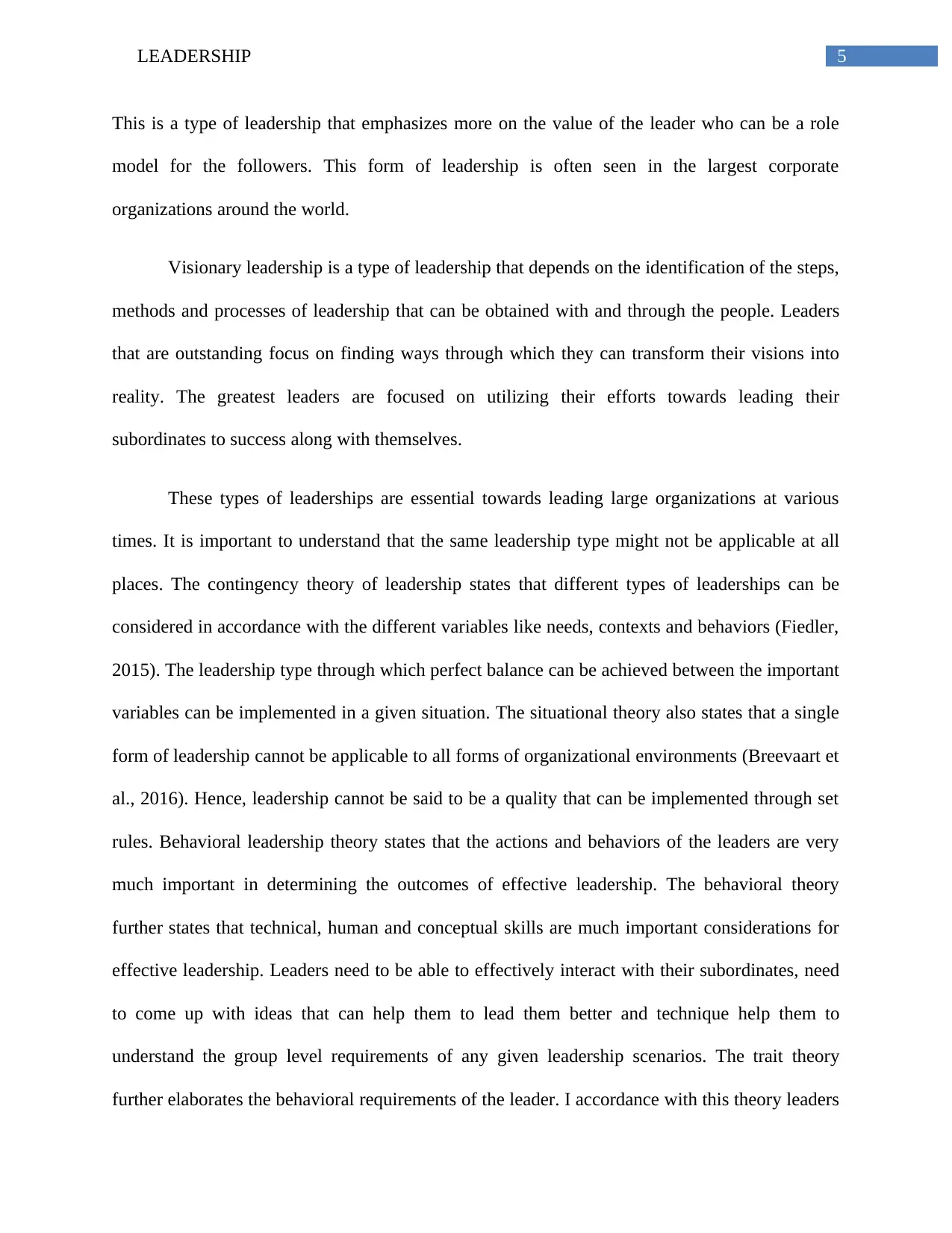
5LEADERSHIP
This is a type of leadership that emphasizes more on the value of the leader who can be a role
model for the followers. This form of leadership is often seen in the largest corporate
organizations around the world.
Visionary leadership is a type of leadership that depends on the identification of the steps,
methods and processes of leadership that can be obtained with and through the people. Leaders
that are outstanding focus on finding ways through which they can transform their visions into
reality. The greatest leaders are focused on utilizing their efforts towards leading their
subordinates to success along with themselves.
These types of leaderships are essential towards leading large organizations at various
times. It is important to understand that the same leadership type might not be applicable at all
places. The contingency theory of leadership states that different types of leaderships can be
considered in accordance with the different variables like needs, contexts and behaviors (Fiedler,
2015). The leadership type through which perfect balance can be achieved between the important
variables can be implemented in a given situation. The situational theory also states that a single
form of leadership cannot be applicable to all forms of organizational environments (Breevaart et
al., 2016). Hence, leadership cannot be said to be a quality that can be implemented through set
rules. Behavioral leadership theory states that the actions and behaviors of the leaders are very
much important in determining the outcomes of effective leadership. The behavioral theory
further states that technical, human and conceptual skills are much important considerations for
effective leadership. Leaders need to be able to effectively interact with their subordinates, need
to come up with ideas that can help them to lead them better and technique help them to
understand the group level requirements of any given leadership scenarios. The trait theory
further elaborates the behavioral requirements of the leader. I accordance with this theory leaders
This is a type of leadership that emphasizes more on the value of the leader who can be a role
model for the followers. This form of leadership is often seen in the largest corporate
organizations around the world.
Visionary leadership is a type of leadership that depends on the identification of the steps,
methods and processes of leadership that can be obtained with and through the people. Leaders
that are outstanding focus on finding ways through which they can transform their visions into
reality. The greatest leaders are focused on utilizing their efforts towards leading their
subordinates to success along with themselves.
These types of leaderships are essential towards leading large organizations at various
times. It is important to understand that the same leadership type might not be applicable at all
places. The contingency theory of leadership states that different types of leaderships can be
considered in accordance with the different variables like needs, contexts and behaviors (Fiedler,
2015). The leadership type through which perfect balance can be achieved between the important
variables can be implemented in a given situation. The situational theory also states that a single
form of leadership cannot be applicable to all forms of organizational environments (Breevaart et
al., 2016). Hence, leadership cannot be said to be a quality that can be implemented through set
rules. Behavioral leadership theory states that the actions and behaviors of the leaders are very
much important in determining the outcomes of effective leadership. The behavioral theory
further states that technical, human and conceptual skills are much important considerations for
effective leadership. Leaders need to be able to effectively interact with their subordinates, need
to come up with ideas that can help them to lead them better and technique help them to
understand the group level requirements of any given leadership scenarios. The trait theory
further elaborates the behavioral requirements of the leader. I accordance with this theory leaders
⊘ This is a preview!⊘
Do you want full access?
Subscribe today to unlock all pages.

Trusted by 1+ million students worldwide
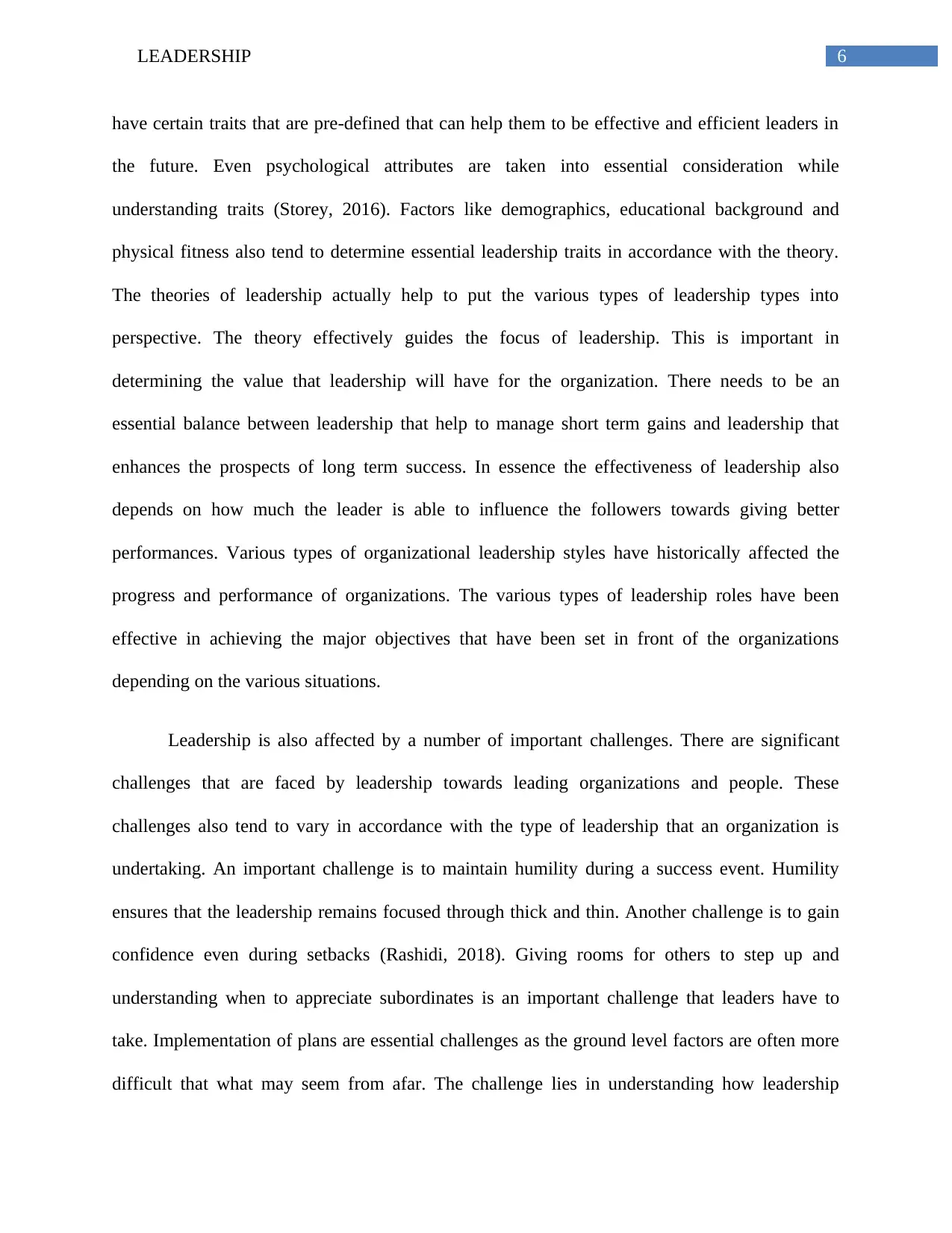
6LEADERSHIP
have certain traits that are pre-defined that can help them to be effective and efficient leaders in
the future. Even psychological attributes are taken into essential consideration while
understanding traits (Storey, 2016). Factors like demographics, educational background and
physical fitness also tend to determine essential leadership traits in accordance with the theory.
The theories of leadership actually help to put the various types of leadership types into
perspective. The theory effectively guides the focus of leadership. This is important in
determining the value that leadership will have for the organization. There needs to be an
essential balance between leadership that help to manage short term gains and leadership that
enhances the prospects of long term success. In essence the effectiveness of leadership also
depends on how much the leader is able to influence the followers towards giving better
performances. Various types of organizational leadership styles have historically affected the
progress and performance of organizations. The various types of leadership roles have been
effective in achieving the major objectives that have been set in front of the organizations
depending on the various situations.
Leadership is also affected by a number of important challenges. There are significant
challenges that are faced by leadership towards leading organizations and people. These
challenges also tend to vary in accordance with the type of leadership that an organization is
undertaking. An important challenge is to maintain humility during a success event. Humility
ensures that the leadership remains focused through thick and thin. Another challenge is to gain
confidence even during setbacks (Rashidi, 2018). Giving rooms for others to step up and
understanding when to appreciate subordinates is an important challenge that leaders have to
take. Implementation of plans are essential challenges as the ground level factors are often more
difficult that what may seem from afar. The challenge lies in understanding how leadership
have certain traits that are pre-defined that can help them to be effective and efficient leaders in
the future. Even psychological attributes are taken into essential consideration while
understanding traits (Storey, 2016). Factors like demographics, educational background and
physical fitness also tend to determine essential leadership traits in accordance with the theory.
The theories of leadership actually help to put the various types of leadership types into
perspective. The theory effectively guides the focus of leadership. This is important in
determining the value that leadership will have for the organization. There needs to be an
essential balance between leadership that help to manage short term gains and leadership that
enhances the prospects of long term success. In essence the effectiveness of leadership also
depends on how much the leader is able to influence the followers towards giving better
performances. Various types of organizational leadership styles have historically affected the
progress and performance of organizations. The various types of leadership roles have been
effective in achieving the major objectives that have been set in front of the organizations
depending on the various situations.
Leadership is also affected by a number of important challenges. There are significant
challenges that are faced by leadership towards leading organizations and people. These
challenges also tend to vary in accordance with the type of leadership that an organization is
undertaking. An important challenge is to maintain humility during a success event. Humility
ensures that the leadership remains focused through thick and thin. Another challenge is to gain
confidence even during setbacks (Rashidi, 2018). Giving rooms for others to step up and
understanding when to appreciate subordinates is an important challenge that leaders have to
take. Implementation of plans are essential challenges as the ground level factors are often more
difficult that what may seem from afar. The challenge lies in understanding how leadership
Paraphrase This Document
Need a fresh take? Get an instant paraphrase of this document with our AI Paraphraser
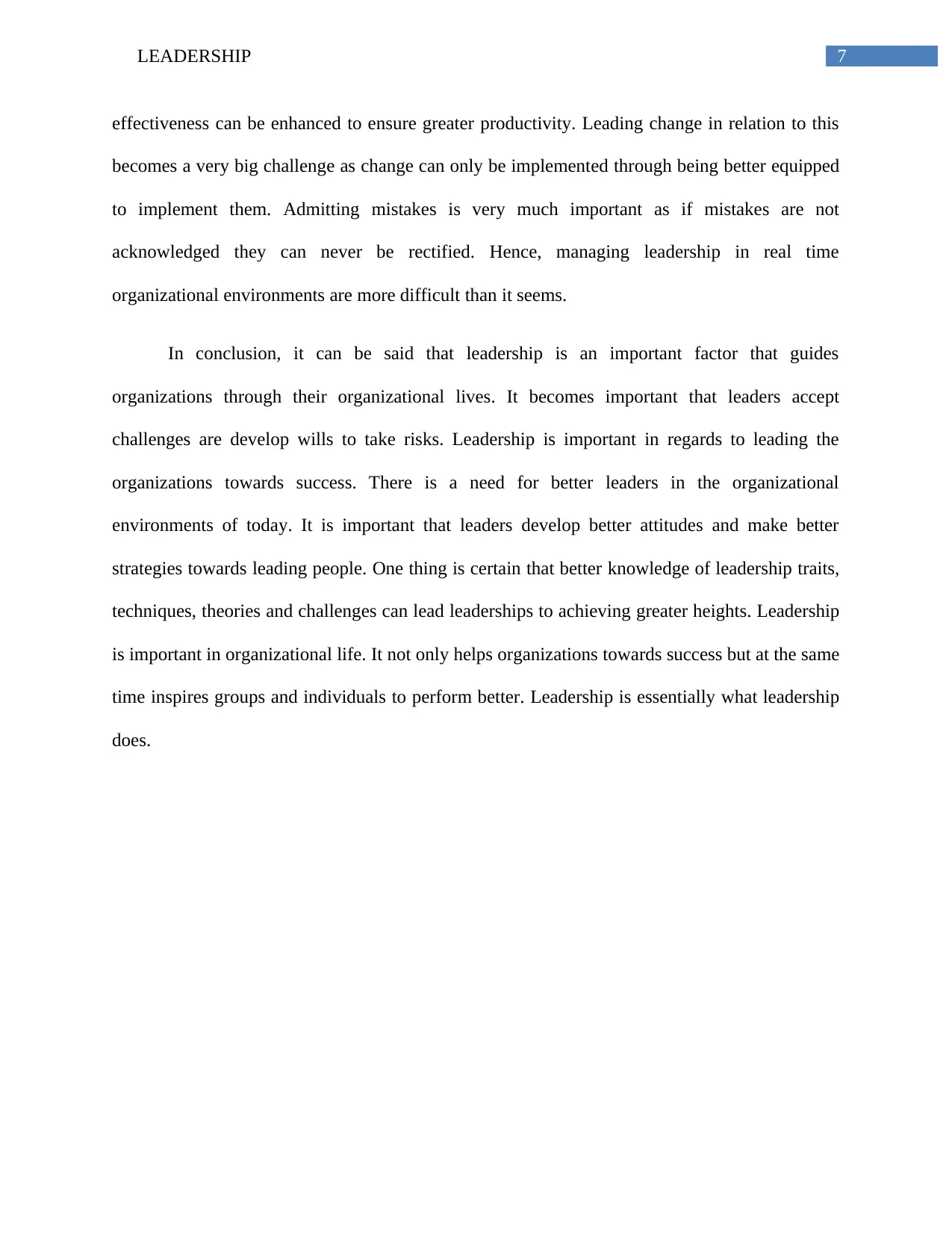
7LEADERSHIP
effectiveness can be enhanced to ensure greater productivity. Leading change in relation to this
becomes a very big challenge as change can only be implemented through being better equipped
to implement them. Admitting mistakes is very much important as if mistakes are not
acknowledged they can never be rectified. Hence, managing leadership in real time
organizational environments are more difficult than it seems.
In conclusion, it can be said that leadership is an important factor that guides
organizations through their organizational lives. It becomes important that leaders accept
challenges are develop wills to take risks. Leadership is important in regards to leading the
organizations towards success. There is a need for better leaders in the organizational
environments of today. It is important that leaders develop better attitudes and make better
strategies towards leading people. One thing is certain that better knowledge of leadership traits,
techniques, theories and challenges can lead leaderships to achieving greater heights. Leadership
is important in organizational life. It not only helps organizations towards success but at the same
time inspires groups and individuals to perform better. Leadership is essentially what leadership
does.
effectiveness can be enhanced to ensure greater productivity. Leading change in relation to this
becomes a very big challenge as change can only be implemented through being better equipped
to implement them. Admitting mistakes is very much important as if mistakes are not
acknowledged they can never be rectified. Hence, managing leadership in real time
organizational environments are more difficult than it seems.
In conclusion, it can be said that leadership is an important factor that guides
organizations through their organizational lives. It becomes important that leaders accept
challenges are develop wills to take risks. Leadership is important in regards to leading the
organizations towards success. There is a need for better leaders in the organizational
environments of today. It is important that leaders develop better attitudes and make better
strategies towards leading people. One thing is certain that better knowledge of leadership traits,
techniques, theories and challenges can lead leaderships to achieving greater heights. Leadership
is important in organizational life. It not only helps organizations towards success but at the same
time inspires groups and individuals to perform better. Leadership is essentially what leadership
does.
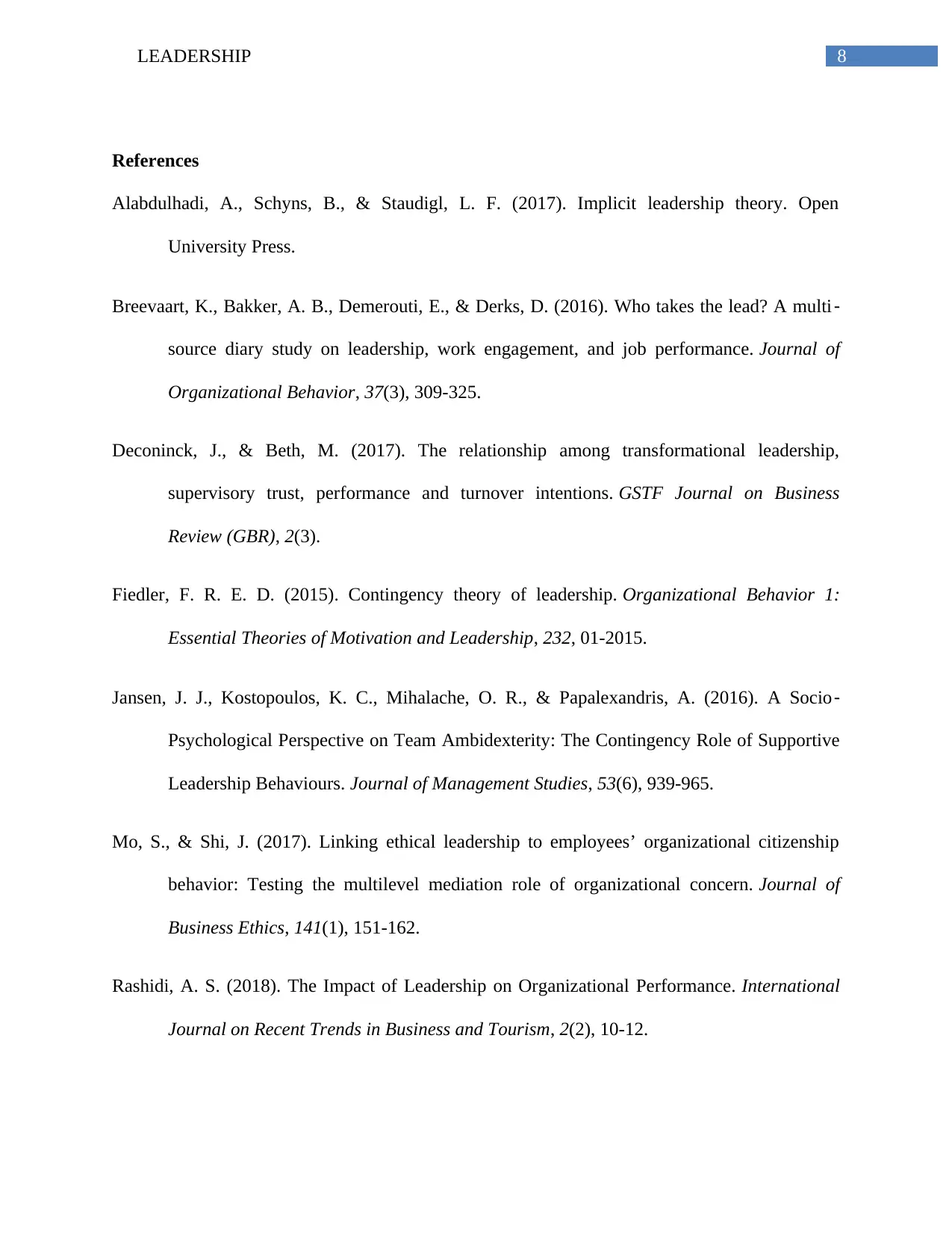
8LEADERSHIP
References
Alabdulhadi, A., Schyns, B., & Staudigl, L. F. (2017). Implicit leadership theory. Open
University Press.
Breevaart, K., Bakker, A. B., Demerouti, E., & Derks, D. (2016). Who takes the lead? A multi ‐
source diary study on leadership, work engagement, and job performance. Journal of
Organizational Behavior, 37(3), 309-325.
Deconinck, J., & Beth, M. (2017). The relationship among transformational leadership,
supervisory trust, performance and turnover intentions. GSTF Journal on Business
Review (GBR), 2(3).
Fiedler, F. R. E. D. (2015). Contingency theory of leadership. Organizational Behavior 1:
Essential Theories of Motivation and Leadership, 232, 01-2015.
Jansen, J. J., Kostopoulos, K. C., Mihalache, O. R., & Papalexandris, A. (2016). A Socio‐
Psychological Perspective on Team Ambidexterity: The Contingency Role of Supportive
Leadership Behaviours. Journal of Management Studies, 53(6), 939-965.
Mo, S., & Shi, J. (2017). Linking ethical leadership to employees’ organizational citizenship
behavior: Testing the multilevel mediation role of organizational concern. Journal of
Business Ethics, 141(1), 151-162.
Rashidi, A. S. (2018). The Impact of Leadership on Organizational Performance. International
Journal on Recent Trends in Business and Tourism, 2(2), 10-12.
References
Alabdulhadi, A., Schyns, B., & Staudigl, L. F. (2017). Implicit leadership theory. Open
University Press.
Breevaart, K., Bakker, A. B., Demerouti, E., & Derks, D. (2016). Who takes the lead? A multi ‐
source diary study on leadership, work engagement, and job performance. Journal of
Organizational Behavior, 37(3), 309-325.
Deconinck, J., & Beth, M. (2017). The relationship among transformational leadership,
supervisory trust, performance and turnover intentions. GSTF Journal on Business
Review (GBR), 2(3).
Fiedler, F. R. E. D. (2015). Contingency theory of leadership. Organizational Behavior 1:
Essential Theories of Motivation and Leadership, 232, 01-2015.
Jansen, J. J., Kostopoulos, K. C., Mihalache, O. R., & Papalexandris, A. (2016). A Socio‐
Psychological Perspective on Team Ambidexterity: The Contingency Role of Supportive
Leadership Behaviours. Journal of Management Studies, 53(6), 939-965.
Mo, S., & Shi, J. (2017). Linking ethical leadership to employees’ organizational citizenship
behavior: Testing the multilevel mediation role of organizational concern. Journal of
Business Ethics, 141(1), 151-162.
Rashidi, A. S. (2018). The Impact of Leadership on Organizational Performance. International
Journal on Recent Trends in Business and Tourism, 2(2), 10-12.
⊘ This is a preview!⊘
Do you want full access?
Subscribe today to unlock all pages.

Trusted by 1+ million students worldwide
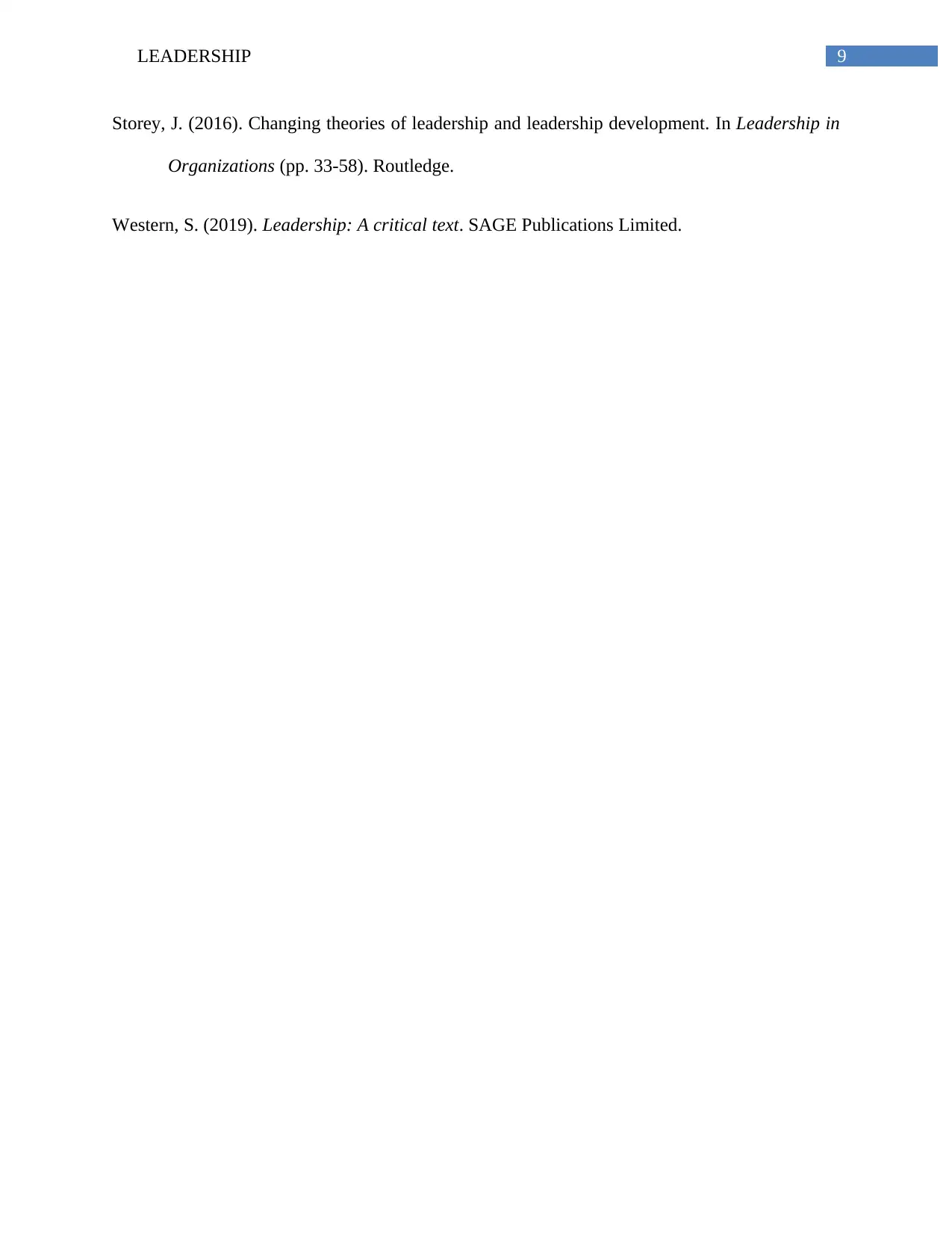
9LEADERSHIP
Storey, J. (2016). Changing theories of leadership and leadership development. In Leadership in
Organizations (pp. 33-58). Routledge.
Western, S. (2019). Leadership: A critical text. SAGE Publications Limited.
Storey, J. (2016). Changing theories of leadership and leadership development. In Leadership in
Organizations (pp. 33-58). Routledge.
Western, S. (2019). Leadership: A critical text. SAGE Publications Limited.
1 out of 10
Related Documents
Your All-in-One AI-Powered Toolkit for Academic Success.
+13062052269
info@desklib.com
Available 24*7 on WhatsApp / Email
![[object Object]](/_next/static/media/star-bottom.7253800d.svg)
Unlock your academic potential
Copyright © 2020–2026 A2Z Services. All Rights Reserved. Developed and managed by ZUCOL.





